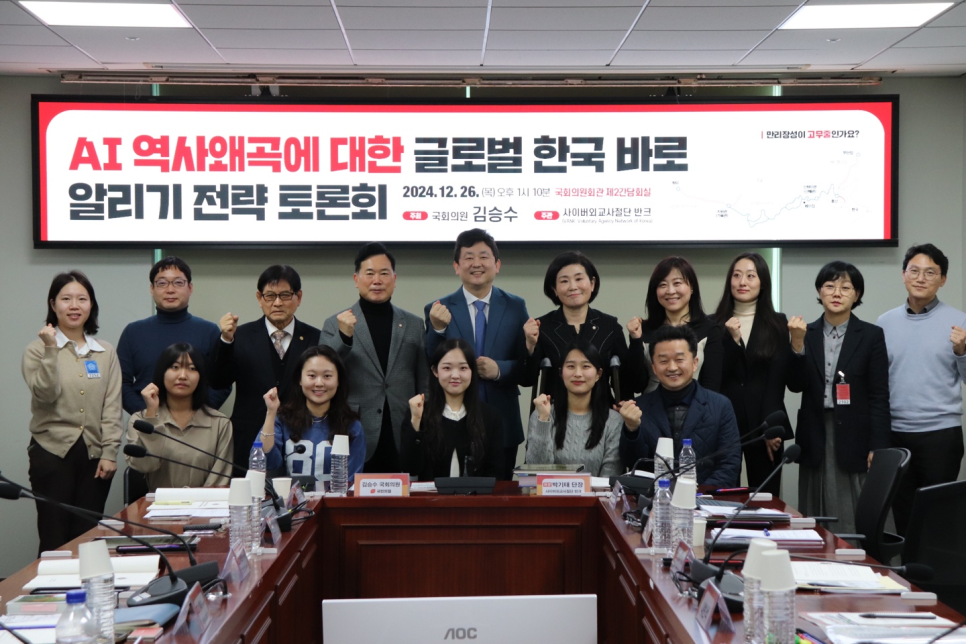
Cyber Diplomacy Organization VANK, together with Representative Kim Seung-soo’s office, held a forum titled “Global Strategies for Correcting AI Historical Distortions about Korea” on December 26, 2024, at 1:10 p.m. at the National Assembly Members’ Office Building in Yeouido, Seoul. The event focused on public-private cooperation to address challenges posed by AI-generated historical distortions.
The forum was organized in response to growing concerns that information about Korea collected and presented by rapidly advancing generative AI systems contains inaccuracies derived from Chinese and Japanese sources, thereby threatening Korea’s sovereignty over its history, territory, and culture.
VANK head Park Ki-tae served as chair of the forum. VANK researcher Kwon So-young delivered the keynote presentation titled “The War over AI-driven Distortions of Korean History and Culture: When It Began and How to Respond.” Following her presentation, a panel discussion was held with participants including: Kim Jin-hee, Director of the Overseas Public Relations Planning Division at the Ministry of Culture, Sports and Tourism; Kim Yul-ri, Head of the Northeast Asian History Response Team at the Ministry of Education; Ryu Jun-sang, Research Fellow at the Northeast Asian History Foundation’s Korea-Japan Research Institute; Bae Hyun-jun, Research Fellow at the Foundation’s Korea-China Research Institute; Cho Dong-joo, Director of the Intangible Heritage Policy Division at the Cultural Heritage Administration; and VANK youth researcher Seong Hye-seung. The session concluded with a Q&A led by VANK youth researchers Koo Seung-hyun and Kim Ji-hye.
In her presentation, Kwon So-young addressed the seriousness of AI-driven distortions, their pathways of dissemination, and potential countermeasures. She warned that as technology advances, AI could be exploited as a tool for historical hegemony—ushering in an era of “digital imperialism,” in which data networks, rather than military force, are used to manipulate global perceptions of history, culture, and territory.
She cited examples of generative AI platforms spreading distorted narratives. For instance, when asked about the name of the sea east of Korea, ChatGPT identified it incorrectly as the “Sea of Japan” instead of the “East Sea.” Similarly, Microsoft’s Copilot introduced Dokdo using the distorted term “Liancourt Rocks.”
Kwon also presented cases of distortions by China, particularly regarding the Great Wall. While China originally registered the Great Wall as a UNESCO World Heritage site in 1987 with a length of 6,352 km, recent claims have extended the wall’s reach, alleging it stretched to Pyongyang. VANK discovered that Copilot currently provides the Great Wall’s length as over 21,000 km, reflecting these distortions. Kwon stressed that if left unchecked, global users may come to falsely believe that the Great Wall historically extended into the Korean Peninsula.
Panelists emphasized the importance of multi-sector collaboration:
- Kim Jin-hee (MCST) expressed strong agreement on the need for public-private cooperation, pledging efforts to provide accurate Korean content online through inter-ministerial partnerships.
- Kim Yul-ri (MOE) noted that while the ministry has focused on correcting errors in foreign textbooks, the AI era requires broader responses to distorted cultural content across platforms.
- Ryu Jun-sang (NAHF) stressed that the proposal for a National Assembly task force (TF) on AI distortions is of great significance and pledged the Foundation’s support in fact-based research.
- Bae Hyun-jun (NAHF) emphasized the need to present credible and authoritative evidence when requesting corrections from international platforms and highlighted the urgency of distributing accurate English-language materials.
- Cho Dong-joo (CHA) suggested either supplying authoritative English-language resources directly to global AI platforms or establishing a Korean-led AI system to provide verified data.
VANK youth researcher Seong Hye-seung underscored the seriousness of China’s Great Wall distortions, linking them to broader efforts such as the Northeast Project that attempt to subsume Goguryeo and Balhae history into China’s narrative. She argued that such distortions not only misrepresent Korea’s past but could also affect its future, warning that they might even be used to justify geopolitical claims.
She also shared VANK’s difficulties in correcting distortions on Wikipedia, noting that edits on the Great Wall issue were repeatedly reversed and contributors faced account suspensions. Because generative AI systems often rely on sources like Wikipedia and Google Search, such distortions become deeply embedded and widely propagated.
During the Q&A, VANK youth researcher Koo Seung-hyun stressed that AI-driven distortions are not only Korea’s problem but a global one, urging Korea to lead international efforts to address the issue. Kim Ji-hye recounted her discovery that a video-generating AI produced a woman in a kimono instead of a hanbok, warning that distortions are spreading beyond text and images into video content. She called for collaboration between government ministries, the Ministry of Science and ICT, and Korean IT companies to foster a Korean AI system capable of generating accurate content.
In closing remarks, VANK head Park Ki-tae emphasized that while Koreans are vigilant against distortions about Dokdo and the East Sea, distortions involving the Great Wall are more complex and difficult to counter. He warned that the rapid spread of false information through AI threatens Korea’s historical, territorial, and cultural sovereignty, and called for proactive strategies to strengthen Korea’s global brand identity.
Representative Kim Seung-soo, co-host of the forum, underscored the urgency of the issue, noting, “This is not a simple error in AI content, but a serious distortion of our history and culture.” He pledged to reflect the forum’s discussions in future legislative efforts.
Moving forward, VANK announced plans to develop a comprehensive strategy for promoting accurate information about Korea globally, in cooperation with the government, National Assembly, academia, and civil society. VANK also called for the establishment of a National Assembly Task Force to systematically address AI-driven distortions, not only correcting historical inaccuracies but also strengthening Korea’s international image and influence.